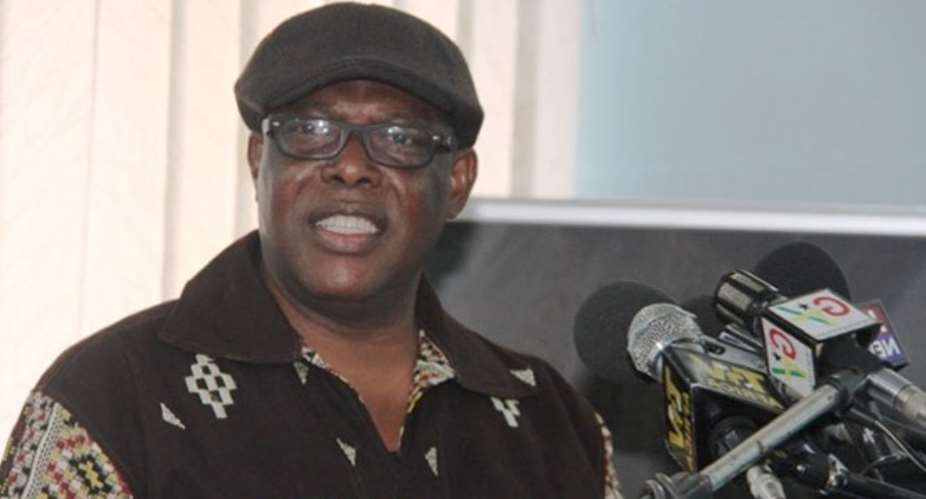Chairman of the National Media Commission (NMC), Nana Kwasi Gyan-Apenteng, has called for the urgent examination of the frameworks establishing and regulating the Commission.
He made the call in a statement during the swearing-in of Kwame Anyimadu-Antwi and Elorm Desewu to the NMC Board on Monday in Accra.
The two new members, who were sworn into office by Justice Vida Akoto-Bamfo, were nominated by the Private Newspapers Association of Ghana, PRINPAG and Parliament.
According to the Chairman, “They are coming on board at a time when the nation needs to do a lot of soul-searching about the kind of media management and regulation it requires.”
He added that “we must urgently examine the frameworks establishing and regulating the NMC itself, because nearly a quarter of a century after the coming into force of the 1992 Constitution, we must test the efficacy and relevance of the Commission itself and how it is able to interface with other parts of our nation's governance structure in responding to the challenges of the moment.”
“The recent determination of complaints of pornography against three television stations is a case in point. We need legislation consistent with our constitutional arrangements to set and apply the standards required for quality broadcasting in the country,” he stated.
“The time has come to ask questions. We have 18 members; they are all very busy people. The Constitution says they are part-timers. This may have been adequate for a time when the Ghana media consisted of one television station, no more than three radio stations and fewer than 10 newspapers, he said.
The Chairman underscored that “today, the Ghana media scene covers more than 400 radio stations, over 70 free-to-air television stations and about 40 newspapers being published daily and weekly.”
“Is the regulatory framework fashioned for another era able to cope with a completely different situation? he quizzed.
“Clearly, a Commission of part-timers would be inadequate for the full-time regulation of such a large industry under any circumstances,” said Mr Gyan-Apenteng.
Apart from the numbers, the Chairman indicated that the media terrain has changed completely because of technology, different political and constitutional dispensation, different social mores and above all, a different set of political economy considerations.
“In welcoming the new members, I want to remind them and us the old members that we take a solemn oath to execute the mandate set for us by the Constitution,” he added.
“We know we are busy people but we need to factor in the work of the NMC in our daily tasks; we must not treat the work of the Commission as some kind of an optional afterthought; a job that is done when we are free of all other obligations, he appealed.
Meanwhile, he has announced that leadership of NMC has started stakeholder consultations with the Ghana Independent Broadcasting Association in order to agree on the principles that will underlie the new laws on standards.
Justice Vida Akoto-Bamfo, a Supreme Court Judge, charged the NMC to help shape media practice in the country, as Ghana seeks to brand itself as an attractive investment and tourist destination.
“NMC should not only limit its media monitoring to radio and television but pay greater attention to what goes on in the digital and social media space,” Justice Akoto-Bamfo said.
She entreated the Commission to exert more pressure on Parliament to pass the Broadcasting Law and the Right to Information Bill (RTI) into law.
According to Justice Akoto-Bamfo, the passage of the RTI would not be in the interest of only media practitioners but the entire citizenry.
“The Right to Information is so important and fundamental to the democratic governance,” he said.
Administering the Oath of Allegiance and Office to the two members, the Supreme Court Judge admonished them to work hard and deliver results that would bring honour to themselves, families and society at large.
“You should be proactive in resolving the complaints of ethical breaches and professional misconduct by the media that come to you,” she said.
The Supreme Court Judge recounted that the NMC in Article 167 of the 1992 Constitution was mandated to establish and maintain high journalistic standards, as well as insulate the State Media from governmental control,” she said.
By Melvin Tarlue





 Election 2024: Ghanaians will vote to erase Akufo-Addo’s horrifying legacy – Nii...
Election 2024: Ghanaians will vote to erase Akufo-Addo’s horrifying legacy – Nii...
 BP killed ex-Weija-Gbawe MCE – Tina Mensah reveals
BP killed ex-Weija-Gbawe MCE – Tina Mensah reveals
 Limited voter registration exercise: NDC slams EC over mass technical challenges
Limited voter registration exercise: NDC slams EC over mass technical challenges
 UK, America will one day come to Ghana to borrow Akufo-Addo to be their presiden...
UK, America will one day come to Ghana to borrow Akufo-Addo to be their presiden...
 EOCO returns fire at OSP over Cecilia Abena Dapaah’s money laundering case
EOCO returns fire at OSP over Cecilia Abena Dapaah’s money laundering case
 Anti-corruption endeavours must be rooted in systems, investigations and prosecu...
Anti-corruption endeavours must be rooted in systems, investigations and prosecu...
 We’ve not introduced 1% cybersecurity levy on banking transactions – BoG
We’ve not introduced 1% cybersecurity levy on banking transactions – BoG
 EU hits out at sidelining of Chad election observers
EU hits out at sidelining of Chad election observers
 ‘Be calm; we’re having engagements on new fee implementation’ — KNUST SRC assure...
‘Be calm; we’re having engagements on new fee implementation’ — KNUST SRC assure...
 Bawumia is compassionate, unique politician without corruption tag — Miracles Ab...
Bawumia is compassionate, unique politician without corruption tag — Miracles Ab...
